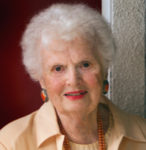By Natasha Josefowitz, ACSW, Ph.D.

LA JOLLA, California — What is important? Important to whom? In terms of what? In terms of people’s philosophy of life? In terms of one’s needs? In terms of one’s strengths? In terms of policy? Or in terms of one’s mental health?
Throughout the years I had collected some people’s thoughts about what they thought was important. So I assembled a variety of answers to this question without judgment. It all seemed plausible depending on the century, the culture, the psychology of the time. What I find intriguing is that in a couple of words one can express a whole philosophy of life.
To wit, in the ancient Greek tradition: the words one lived by were “honor, glory, courage.” Indeed the Greek stories were all about these three concepts. You might remember Achilles who—given a choice between a short life of glory or a long, but inconsequential life—chose the glory. The Jewish tradition is based on the words “justice and law.” To act with fairness and obey the law is what was required of the Jewish people and still is today in the Orthodox communities where most behaviors are strictly regulated. Some of the less traditional Jews (I call them tribal Jews) still light candles to memorialize the death of loved ones, don’t eat pork or shellfish, and go to temple on High Holidays. The Christian tradition emphasizes “obedience and grace.” Obedience means surrendering one’s will to God. Grace is God’s gift to the world and its inhabitants. The scientific tradition sticks to “reason and logic.” In other words, scientific thinking is based on research, proof, thought-through conclusions, and eschews fantasies and unproven theories.
New York Times correspondent David Brooks has often written about the importance of our needs, strengths, and the meaning of life. He names our lives’ four purposes: a) commitment to family and to oneself; b) commitment to one’s craft, which includes one’s work; c) commitment to one’s values, which may include one’s faith; and d) commitment to community, which is the capacity to make a difference in other people’s lives. He also writes about some of our basic needs: a) the need for certainty (we tend to be risk-averse); b) the need for variety (we like change); c) the need for significance (we wish to be a recognized member of our community); d) the need for connection to others (our need for love); e) the need for growth (to keep learning, which includes curiosity and open-mindedness); and f) the need to contribute (to be of service to others).
We need strengths in the following areas: a) humility (letting go of one’s self-importance); b) firmness (sticking to one’s beliefs as opposed to flaccidity, being wishy-washy); c) grit (the courage to sustain unpopular views, without rigidity); d) generosity (sharing one’s knowledge and giving credit); e) self-reflection, self-control, and optimism; and f) autonomy (the use of authority).
The 19th century German philosopher Frederick Nietzsche asked four questions about what is important: a) What have you truly loved? b) What has uplifted your soul? c) What has dominated you? and d) What has delighted you? In his 1941 State of the Union Address, President Franklin D. Roosevelt spoke of the four freedoms: freedom of speech and expression, freedom of worship, freedom from want, and freedom from fear.
What all of the above ways of seeing the world point to is the variety of perceptions of what matters. We can select the pieces which fit our own beliefs and examine the possibility of adding new concepts to our understanding.
The old Persian proverb comes to mind: “He who knows not; and knows not that he knows not is a fool, shun him. He who knows not; and knows that he knows not is a child, teach him. He who knows; and knows not that he knows is asleep, wake him. He who knows; and knows that he knows is wise, follow him.”
I would like to end this column with how five Jews have changed the way we see the world: a) Moses—the law is everything, b) Jesus—love is everything, c) Marx—money is everything, d) Freud—sex is everything, and e) Einstein—everything is relative.
*
© Natasha Josefowitz. This article appeared initially in the La Jolla Village News. You may comment to natasha.josefowitz@sdjewishworld.com